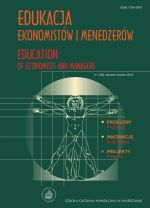Treść głównego artykułu
Abstrakt
The paper presents original study and its findings concerning the possibility of using personality traits and motivational traits as predictors of social competence. According to the findings, motivational traits, including social anxiety and managerial and organisational interests, correlate highly with social competence in situations of social exposure and requiring self-assertion. Hence, motivational traits are highly useful predictors of social competence in both types of social situations. Moreover empirical findings point out that in order to increase the accuracy of estimating social competence both personality traits and motivational traits should be considered. Measurement of both traits estimates the level of social competence more accurately than the measurement of personality traits. Implication for occupational selection is discussed.
Szczegóły artykułu
Autor (Autorzy) artykułu oświadcza, że przesłane opracowanie nie narusza praw autorskich osób trzecich. Wyraża zgodę na poddanie artykułu procedurze recenzji oraz dokonanie zmian redakcyjnych. Przenosi nieodpłatnie na Oficynę Wydawniczą SGH autorskie prawa majątkowe do utworu na polach eksploatacji wymienionych w art. 50 Ustawy z dnia 4 lutego 1994 r. o prawie autorskim i prawach pokrewnych – pod warunkiem, że praca została zaakceptowana do publikacji i opublikowana.
Oficyna Wydawnicza SGH posiada autorskie prawa majątkowe do wszystkich treści czasopisma. Zamieszczenie tekstu artykuły w repozytorium, na stronie domowej autora lub na innej stronie jest dozwolone o ile nie wiąże się z pozyskiwaniem korzyści majątkowych, a tekst wyposażony będzie w informacje źródłowe (w tym również tytuł, rok, numer i adres internetowy czasopisma).
Osoby zainteresowane komercyjnym wykorzystaniem zawartości czasopisma proszone są o kontakt z Redakcją.
![]()
Referencje
-
1. Bartram D., The great eight competencies: A criterion-centric approach to validation, “Journal of Applied Psychology” 2005, No 90.
2. Cascio W. F., Aguinis H., Applied psychology in human resource management, Pearson, London 2011.
3. Francuz P., Mackiewicz R., Liczby nie wiedzą, skąd pochodzą. Przewodnik po metodologii i statystyce, Wydawnictwo KUL, Lublin 2005.
4. Furnham A., Personality and intelligence at work, Routledge, London 2008.
5. Hayes J., Interpersonal skills at work, Routledge, London 2004.
6. Kanfer R., Heggestad E. D., Individual differences in motivation: traits and self-regulatory skills, in: Learning and individual differences: Process, trait, and content determinants, Eds. P. L. Ackerman, P C., Kyllonen, R. D. Roberts, APA, Washington 1999.
7. Leary M. R., Hoyle R. H. Ed., Handbook of individual differences in social behavior, The Guilford Press, London 2009.
8. Matczak A., Kwestionariusz Kompetencji Społecznych KKS. Podręcznik, Pracownia Testów Psychologicznych PTP, Warszawa 2001.
9. Matczak A., Ciechanowicz A., Stańczak J., Jaworowska A., Zalewska E., Wielowymiarowy Kwestionariusz Preferencji WKP. Narzędzie do pomiaru zainteresowań zawodowych. Podręcznik, Pracownia Testów Psychologicznych PTP, Warszawa 2006.
10. McCroskey J. C., Heisel A. D., Richmond V. P., Eysenck’s Big Three and communication traits: three correlational studies, “Communication Monographs”.
11. McCrae R. R., Costa P. T. Jr., The structure of interpersonal traits: Wiggins’s Circumplex and the Five-Factor Model, “Journal of Personality and Social Psychology”.
12. Smółka P., Osobowościowe uwarunkowania efektywnego funkcjonowania w sytuacjach społecznej ekspozycji, non-published doctoral thesis, Uniwersytet Warszawski, Warszawa 2007.
13. Smółka P., Kwestionariusze osobowości jako narzędzia pomocne w ocenie kompetencji społecznych. Implikacje dla preselekcji kandydatów na stanowiska wymagające wysokich umiejętności interpersonalnych, „Edukacja Ekonomistów i Menedżerów”, 2011, 3(21).
14. Spitzberg B. H., Cupach W. R., Interpersonal skills, in: Handbook of interpersonal communication, Eds. H. L. Knapp, J. A. Daly, Sage, Thousand Oaks 2002.
15. U.S. Department of Labor and Training Administration, Understanding test quality concepts of reliability and validity, 1999, [Online] Available: http://www.hr-guide.com/data/G362.htm September 26, 2011Zakrzewski J., Strzałkowska A., Dyspozycyjna koncentracja na sobie: teoria i pomiar (polska adaptacja), in: Techniki kwestionariuszowe w diagnostyce psychologicznej, Ed. R. Ł. Drwal, Wydawnictwo UMCS, Lublin 1989.
16. Zawadzki B., Strelau J., Szczepaniak P., Śliwińska M., Inwentarz osobowości NEO-FFI Costy i McCrae, Pracownia Testów Psychologicznych PTP, Warszawa 1998.
Referencje
2. Cascio W. F., Aguinis H., Applied psychology in human resource management, Pearson, London 2011.
3. Francuz P., Mackiewicz R., Liczby nie wiedzą, skąd pochodzą. Przewodnik po metodologii i statystyce, Wydawnictwo KUL, Lublin 2005.
4. Furnham A., Personality and intelligence at work, Routledge, London 2008.
5. Hayes J., Interpersonal skills at work, Routledge, London 2004.
6. Kanfer R., Heggestad E. D., Individual differences in motivation: traits and self-regulatory skills, in: Learning and individual differences: Process, trait, and content determinants, Eds. P. L. Ackerman, P C., Kyllonen, R. D. Roberts, APA, Washington 1999.
7. Leary M. R., Hoyle R. H. Ed., Handbook of individual differences in social behavior, The Guilford Press, London 2009.
8. Matczak A., Kwestionariusz Kompetencji Społecznych KKS. Podręcznik, Pracownia Testów Psychologicznych PTP, Warszawa 2001.
9. Matczak A., Ciechanowicz A., Stańczak J., Jaworowska A., Zalewska E., Wielowymiarowy Kwestionariusz Preferencji WKP. Narzędzie do pomiaru zainteresowań zawodowych. Podręcznik, Pracownia Testów Psychologicznych PTP, Warszawa 2006.
10. McCroskey J. C., Heisel A. D., Richmond V. P., Eysenck’s Big Three and communication traits: three correlational studies, “Communication Monographs”.
11. McCrae R. R., Costa P. T. Jr., The structure of interpersonal traits: Wiggins’s Circumplex and the Five-Factor Model, “Journal of Personality and Social Psychology”.
12. Smółka P., Osobowościowe uwarunkowania efektywnego funkcjonowania w sytuacjach społecznej ekspozycji, non-published doctoral thesis, Uniwersytet Warszawski, Warszawa 2007.
13. Smółka P., Kwestionariusze osobowości jako narzędzia pomocne w ocenie kompetencji społecznych. Implikacje dla preselekcji kandydatów na stanowiska wymagające wysokich umiejętności interpersonalnych, „Edukacja Ekonomistów i Menedżerów”, 2011, 3(21).
14. Spitzberg B. H., Cupach W. R., Interpersonal skills, in: Handbook of interpersonal communication, Eds. H. L. Knapp, J. A. Daly, Sage, Thousand Oaks 2002.
15. U.S. Department of Labor and Training Administration, Understanding test quality concepts of reliability and validity, 1999, [Online] Available: http://www.hr-guide.com/data/G362.htm September 26, 2011Zakrzewski J., Strzałkowska A., Dyspozycyjna koncentracja na sobie: teoria i pomiar (polska adaptacja), in: Techniki kwestionariuszowe w diagnostyce psychologicznej, Ed. R. Ł. Drwal, Wydawnictwo UMCS, Lublin 1989.
16. Zawadzki B., Strelau J., Szczepaniak P., Śliwińska M., Inwentarz osobowości NEO-FFI Costy i McCrae, Pracownia Testów Psychologicznych PTP, Warszawa 1998.
